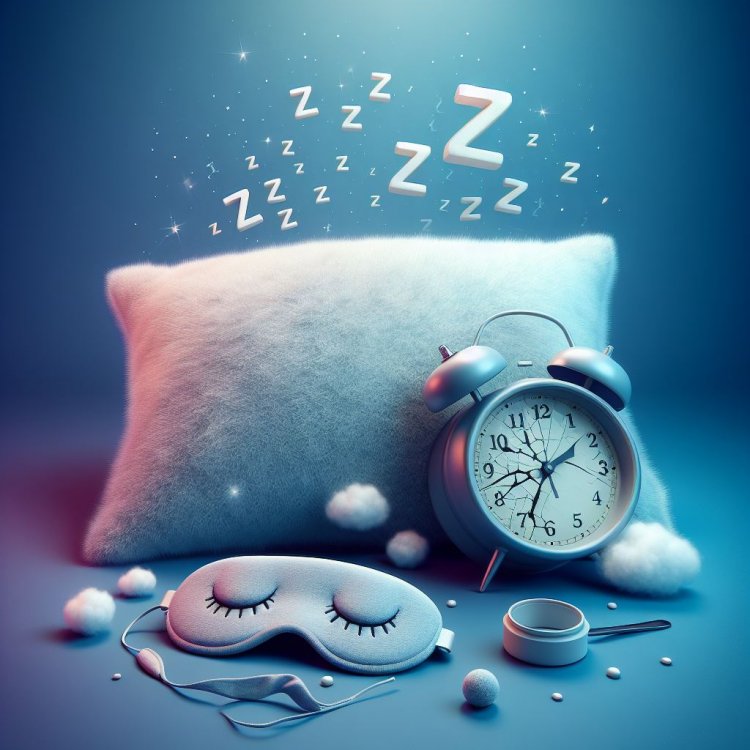Unlocking the Power of Sleep: Understanding Its Vital Importance
Discover the profound significance of sleep and its impact on overall health and well-being. Explore the essential role of sleep in promoting physical, mental, and emotional wellness, and learn valuable insights into optimizing your sleep routine for a healthier lifestyle.

Sleepless in the Modern World: Are You Getting Enough Rest?
Imagine this: it's Friday morning, and for the first time in what feels like forever, you wake up feeling naturally refreshed. No blaring alarm clock, no desperate scramble for coffee – just pure, rested bliss. Sounds like a dream, right? Well, for two-thirds of adults in developed countries, it is.
We're living in a sleep-deprived society. The recommended eight hours of nightly sleep feels like a luxury many can't afford. But here's the thing: sleep isn't a luxury, it's a necessity. Just like you wouldn't skip meals, neglecting sleep has serious consequences for your physical and mental health.
So, how do we bridge this sleep gap? Let's ditch the late-night screen time, create relaxing bedtime routines, and prioritize those precious eight hours. Remember, a well-rested you is a happier, healthier you!
-
The Eye-Opening Effects of Sleep Deprivation: A Descent into Foggy Thinking and Fragile Health
Imagine navigating a world shrouded in perpetual twilight. Details blur, thoughts become sluggish, and even the simplest tasks feel like scaling a mountain. This, unfortunately, is the reality for many who struggle with chronic sleep deprivation. It's not just about feeling tired; it's a descent into a state where our cognitive function, mood, and overall health become demonstrably compromised.
The effects on our cognitive abilities are some of the most immediate. Sleep deprivation disrupts the delicate dance between brain regions responsible for memory, learning, and decision-making. Studies show a decrease in working memory, the crucial space where we hold information for immediate use. Learning new things becomes a struggle, and recalling even familiar details can feel like sifting through fog. Our ability to focus and concentrate plummets, making it difficult to follow instructions, complete tasks, or stay engaged in conversations. Decision-making suffers as well, with a tendency towards impulsivity and poor judgment.
Mood takes a significant hit too. Sleep deprivation is a well-known trigger for irritability and emotional dysregulation. Patience wears thin, frustration bubbles easily, and even minor annoyances can feel overwhelming. The ability to manage stress effectively diminishes, leaving us feeling vulnerable and on edge. This can strain relationships, both personal and professional, as our interactions become colored by negativity and short tempers.
Perhaps most concerning are the long-term health consequences of sleep deprivation. Chronic lack of sleep is linked to an increased risk of developing chronic diseases like heart disease, diabetes, and even some forms of cancer. The immune system weakens, making us more susceptible to infections and illnesses. Sleep also plays a vital role in regulating hormones, and disrupted sleep patterns can lead to weight gain and metabolic imbalances.
So, the next time you're tempted to burn the midnight oil or sacrifice sleep for that extra episode, remember: the consequences reach far beyond a yawn and a foggy head. Sleep is not a luxury, it's the foundation for a healthy, well-functioning mind and body. By prioritizing sleep, we invest in our cognitive prowess, emotional well-being, and overall health. It's a choice with far-reaching benefits, opening our eyes to a world of clarity, focus, and resilience
-
The detrimental effects extend beyond the individual. Sleep-deprived workers are more prone to accidents and injuries, and their productivity plummets. Drivers who haven't had enough sleep become a danger on the road, with reaction times slowed and judgment impaired. In a society that demands constant alertness and performance, the ripple effects of sleep deprivation are undeniable.
-
Why We Need Sleep: The Science Behind Brain Plasticity and Memory ConsolidationSleep isn't just a period of rest; it's a vital biological process essential for optimal brain function. Dr. Matthew Walker, a leading sleep scientist and author of the acclaimed book "Why We Sleep: Unlocking the Power of Sleep and Dreams," has dedicated his career to understanding the intricate workings of sleep and its profound impact on our brains.
Brain Plasticity: Remodeling for Learning and Memory
One of the most crucial roles of sleep is its influence on brain plasticity. This refers to the brain's remarkable ability to adapt and change throughout life. During sleep, particularly during deep sleep stages, the brain undergoes a process of synaptic pruning. Essentially, weak or unused connections between brain cells are trimmed, while strong and frequently used connections are strengthened. This streamlining process allows the brain to become more efficient at processing information and forming new memories.
Memory Consolidation: Locking in New Information
Sleep also plays a critical role in memory consolidation. When we learn something new, the brain creates a weak memory trace. During sleep, this trace is replayed and strengthened, solidifying the memory and making it more likely to be retrieved later. Studies by Dr. Walker and others have shown that sleep deprivation significantly impairs memory consolidation. People who are sleep-deprived have difficulty retaining new information and are more likely to forget things they've recently learned.
-
Dream-Genie Unleashed: Unveiling the Mysteries of DreamingThe Dream Factory: A Stage for Memory Consolidation
Dreaming isn't a random firing of neurons; it's a carefully orchestrated process with a purpose. One of its key functions is to aid in memory consolidation. During REM (Rapid Eye Movement) sleep, a stage characterized by vivid dreaming, the brain replays and rehearses recent experiences. This replay strengthens memory traces, solidifying what we've learned and experienced while awake. Dr. Walker's research suggests that REM sleep allows the brain to separate the essential elements of an experience from extraneous details. This process refines our memories, making them more efficient and easier to recall later.
-
Emotional Processing: The Dream World as a Therapist's Couch
-
Dreams also serve as a platform for emotional processing. The emotional intensity of dreams is often heightened, allowing us to confront and work through our emotions in a safe, non-threatening environment. Dr. Walker theorizes that dreams provide a way to rehearse emotional responses to potentially stressful situations, fostering emotional resilience. For example, someone who has recently experienced a stressful event might dream about it, allowing them to process the emotions associated with it in a controlled setting. Through this process, dreams can help us regulate our emotions and become better equipped to handle them when awake.
The Mechanisms of Dreaming: Unveiling the Neural Orchestra
The precise mechanisms underlying dreaming are still being unraveled, but Dr. Walker's research offers some intriguing insights. During REM sleep, brain regions associated with emotion and memory become highly active, while the prefrontal cortex, responsible for logic and reasoning, takes a backseat. This allows for a more free-flowing and emotional experience. Additionally, brain chemicals like norepinephrine, which plays a role in memory and emotional arousal, surge during REM sleep, potentially contributing to the vividness and emotional intensity of dreams.
The Importance of REM Sleep for Dreaming
It's important to note that not all sleep stages involve dreaming. Vivid dreaming primarily occurs during REM sleep, which makes up about 25% of total sleep in adults. When REM sleep is disrupted due to factors like sleep apnea or sleep deprivation, dreaming is significantly curtailed. Dr. Walker's research suggests that this lack of REM sleep can hinder memory consolidation and emotional processing, potentially leading to cognitive and emotional difficulties.
By unlocking the secrets of dreaming, Dr. Matthew Walker's work sheds light on its vital role in brain function. Dreaming isn't just a curious nightly phenomenon; it's a purposeful process that strengthens memories, regulates emotions, and contributes to our overall cognitive and emotional well-being. Prioritizing sleep, particularly REM sleep, ensures we reap the benefits of this nightly odyssey through the dream world.
-

The Deceptive Double-Edged Sword: Unveiling the Complexities of Caffeine and Sleep
Caffeine, our go-to beverage for a quick pick-me-up, has a complex relationship with sleep. While it offers a temporary boost in alertness, its impact on our slumber is far less straightforward. Let's delve deeper into the science behind caffeine and its influence on the intricate world of sleep:
The Blockade: Interfering with the Sleep-Wake Cycle
Caffeine works by mimicking the effects of adenosine, a brain chemical that promotes sleepiness. However, caffeine isn't a perfect imposter. It binds to adenosine receptors in the brain, blocking them from recognizing true adenosine. This blockade disrupts the natural sleep-wake cycle, making it harder to fall asleep and reducing the overall quality of sleep.
The Thief of Deep Sleep: Stealing the Most Restorative Stage
Sleep isn't a uniform state; it cycles through various stages throughout the night. Deep sleep, characterized by slow brain waves and relaxed muscles, is the most restorative phase. Here's the bad news for coffee lovers: caffeine acts like a thief, stealing away precious deep sleep. Studies show that even moderate caffeine intake before bed can significantly decrease the amount of time spent in deep sleep. This loss of deep sleep disrupts memory consolidation, weakens the immune system, and hinders physical repair processes that occur during this vital stage.
The Jittery Culprit: Heightening Anxiety and Disrupting Rest
Caffeine's stimulating effects extend beyond alertness. It can also trigger anxiety and restlessness, making it even harder to drift off to sleep. This is particularly true for individuals with sensitivity to caffeine. The jitters and racing thoughts induced by caffeine can disrupt the calming process needed for sleep onset. Furthermore, caffeine can irritate the stomach, leading to discomfort and further hindering a peaceful night's rest.
The Half-Life Hangover: The Lingering Effects of Caffeine
Don't be fooled by a mid-afternoon coffee; caffeine's effects can linger for hours. The human body takes about six hours to eliminate half of the caffeine consumed. This means that a cup of coffee enjoyed at 4 pm can still be impacting your sleep quality well past 10 pm. For those with slower caffeine metabolism, the lingering effects can be even more pronounced.
Finding Balance: A Personalized Approach
The impact of caffeine on sleep varies greatly between individuals. Some may tolerate a late-afternoon cup with minimal disruption, while others might experience significant sleep disturbances. It's important to understand your own sensitivity and adjust caffeine intake accordingly. If you struggle with sleep, consider eliminating caffeine in the afternoon and evening hours.
By understanding the complex interplay between caffeine and sleep, we can make informed choices for better sleep hygiene. Remember, a good night's rest is crucial for optimal health and well-being. So, the next time you reach for that cup of coffee, weigh the short-term energy boost against the potential disruption to your precious sleep.
What's Your Reaction?




















